- Home
- Franklin Horton
Child With No Name Page 2
Child With No Name Read online
Page 2
“That’s only some of the inventory,” Efra translated. “He might have more in two weeks. Did your boss express some kind of preference? An age or sex? A hair color?”
Ty couldn’t answer immediately. He mechanically flipped through the photos because that’s what he was supposed to do. He had to be certain the pictures depicted children and not simply young adults made to look like children. As he scanned them, he held the pictures far enough from his face that the camera in the bill of his cap recorded what he was looking at. That would be crucial for evidence later.
Despite his best efforts to block out what he was looking at, the contents of the pictures seeped into Ty's mind. These were pictures of children doing things children should not be doing. He felt his face flush and his head swim. He wanted to throw up, but more than that he wanted to murder the man in front of him. He couldn’t do that though. Murder was obviously outside of the rules of engagement. If he blew the op, they might capture Auroja but there was no guarantee they'd ever find or rescue these children. Ty had to choke it down.
Auroja leaned forward over the table, staring at Ty with bleary red eyes. He took another hit off the joint, exhaling the smoke from his nose. He whispered something that Ty didn’t understand.
Ty looked to Efra, who shifted uncomfortably in his chair. “What did he say?”
“Señor Auroja says he sees the way you look at those children. He says you're curious. He wonders if you're really here to make arrangements for your boss or if you're shopping for yourself. He says he can take you to a place right now where you can sample for yourself if you want. For a nominal fee, of course.”
Ty shifted his eyes from Efra to Auroja. The older man grinned widely as his message was translated, a gold tooth winking from a row of decaying teeth. Ty met his eyes and smiled as all his training, all his preparation, went out the window. He flipped the table over onto Auroja and the man’s chair toppled over backward. The move sent Efra sprawling onto the concrete as well. Auroja's legs jutted from beneath the overturned table. Ty grabbed them and tugged him free of the melee.
“Dude! Dude!” Auroja screamed in English but Ty wasn’t hearing it.
He dropped onto Auroja’s chest and drew back for a punch. Before he could drop it, Badger tackled him from the side, rolling him up in a bear hug.
“Ty!” Badger screamed. “Ty!”
Then they were instantly surrounded by more people, all of them speaking Ty’s name, trying to bring him down. As their words seeped in, his fury dissipated. Cliff Mathis broke through the circle of bodies and stared down at Ty. He didn’t even have to say a word.
Ty released a deep breath and tried to force his muscles to relax. “I’m sorry, Cliff. I fucked up. I lost it, man.”
“Auroja, you good?” Cliff said.
Auroja walked into Ty’s line of sight. “I’m fine, bro, but that shit was close. Thanks, Badger. You saved my ass.”
Badger gave him a nod. “No prob.”
“Okay, back to work, everyone,” Cliff said. "Let's clean up this mess."
Badger eased his grip and rolled free of Ty. Ty lay on his back on the gritty concrete, staring up at the ceiling.
“I fucked up," he repeated.
Cliff stood overtop him and extended a hand. Ty took it and Cliff hauled him to his feet. “We’ve all been there, man. That’s the point of the training. No one has the tools in their arsenal to deal with this shit right out of the box. It's too messed up. Every fiber of your humanity tells you that what you're looking at is wrong."
Ty was shaking his head in frustration. “That's exactly it, man. I saw those pictures and this wasn’t training anymore.”
Cliff led Ty away from the rest of the team. “You’re not the first to do that. That’s why we train. That’s why I bring in shady characters like Auroja to keep it real. He thinks like a criminal and acts like a criminal because he was a criminal. He throws in stuff like drinking and blowing weed smoke in your face because that’s the kind of shit the enemy will do.”
“He totally convinced me. I lost sight of this being an exercise. I forgot the objective.”
“You can’t do that in the field, Ty. Blowing an op means kids don’t get saved. That’s what you always have to remember. If we don’t succeed, there may never be another chance at that group of kids.”
“I didn’t expect the pictures.”
“They’re not real. They’re computer-generated to look real.”
“They fooled me,” Ty said, rubbing his hand through his hair. “I kind of blacked out after that.”
“You have to expect the unexpected. You’ll see worse than those pictures on real ops. You’ll see videos. You’ll see real kids paraded in front of you like livestock. There will be offers of things that will sicken you to your soul and you’ll be forced to decline them politely. That comes with time and practice. You’ll get this.”
Ty was shaking his head, staring at the floor as he walked. “I don’t know, man. Maybe I’m not cut out for this.”
Cliff patted him on the back. “Have faith, buddy. Now let’s get you to the hot-wash so we can run another team through.”
3
There was a dusty RV parked out of sight behind the hangar. Sometimes it served as a mobile command center for the Door Kickers. Other times it served as cover, a way to hide in plain sight and collect intelligence. Today it was the mobile hot-wash station, where new operators could meet with the team shrink and debrief after what they’d just been through.
Ty banged on the door, then let himself in. The interior was cool and dark, the blinds closed most of the way to keep out the searing Arizona heat. Bruce Cowan was a doctorate-level psychologist who’d left the Veteran’s Administration system to provide support for Cliff and his people on a contract basis. He was in practice with a psychiatrist who could prescribe and adjust meds when they were the proper course of treatment for the DKI staff with PTSD symptoms. Today Bruce’s role was to help the new guys process this latest training exercise. Emotional and psychological support was critical to carrying out their mission.
Once Ty’s eyes adjusted to the dark interior, he found Bruce sitting sideways in the dinette, his feet stretched out into the aisle. He was wearing dress clothes with a tie and glaringly white New Balance tennis shoes. “Care for something to drink? There’s coffee, water, and some soft drinks.”
Ty grabbed a bottle of cold water from the refrigerator and slumped into the booth. “I fucked up, Bruce.”
The two had met several times already. Ty had been attending regular sessions with Bruce since accepting employment with Door Kickers International. From Virginia, the two had telemedicine appointments via videoconferencing. When Ty was training in Arizona, they met in person. As he’d promised Cliff, Ty was completely honest with Bruce about his symptoms and they were making some progress. Ty wasn’t “fixed” but he was feeling better and that was an improvement.
“Well, let’s talk about it. How exactly did you fuck up?”
“It got real in there. Too real. I forgot it was training.”
Bruce shrugged. “Realism is critical. It’s the best preparation for working out in the field. You know that from the military, right?”
“The guy drinking and smoking dope. It threw me off. His whole demeanor, those...pictures...he threw out. All of it. It was too much. It messed with my head.”
Bruce took a sip of coffee. “Don’t be too hard on yourself, Ty. You’re not the first person to blow this exercise. That’s why this step is part of your training. It's like a live-fire exercise.”
Ty drained his water bottle in a single gulp, then replaced the cap. “I don’t know, man. I don’t know if I can do this.”
“If you’d walked off the street and gone to Afghanistan with no training you’d have felt the same way. It was your training that allowed you to do the job you were sent over there to do. This will be the same way. These missions will never be routine, but the training will help you get your head straight. I
t gives you the foundation you need to do the job.”
Ty let out a long breath. “I hope you’re right. If it was a matter of running more miles, rucking more weight, or spending more hours at the range, I’d agree with you. How the hell can anyone harden themselves against something like this, though?”
Bruce tapped a finger on the table. “By doing exactly what you’re doing here today. This is training like you’ve never had to do before. You’re preparing your mind for exposure to things it’s never seen or dealt with. You can’t let hate and disgust blind you. If we turn our heads away, what happens to those victims? That’s the thing that keeps us going. That's our mission.”
Ty slammed his palm on the table. “But how do you deal with it? By compartmentalizing?”
“That’s part of it.”
“I don’t have a fucking compartment for anything like this. No one does.”
“We’re building one now,” Bruce said. “The process has already begun. We build a solid box where you can put these things when the operation is over. That's how our people do their jobs and still live a normal life.”
Ty looked doubtful. “If I was any good at compartmentalizing I wouldn’t be struggling with PTSD. I’d be able to separate the war from the rest of my life and leave it there.”
“I don’t think it works that way,” Bruce said. “You can’t just suddenly forget you’re a warrior. You need to understand that you’ll always be a warrior, but the mission can change. One day your mission is running patrols in the sandbox, the next it’s running your daughter to ballet or going to your job.”
“I don’t have a daughter.”
“You get my point though, right? Live every day like it's a mission, then wrap it up and move onto the next one. The goal is to leave the mission behind but not the warrior.”
“No offense, Bruce, but it sounds like counselor bullshit to me.”
Bruce laughed. “It might sound like that now, but give it time, Ty. PTSD is complicated and there’s no magic bullet. Every case is different because every person is different. You’ve indicated that you're seeing some improvement, right?”
Ty rocked his hand in the air, a so-so gesture.
“It’s a work-in-progress,” Bruce said. “The important part is you let me know if you start thinking about taking drastic measures."
"Like offing myself?"
Bruce nodded. "That's exactly what I mean. Do we have a deal?”
“Yes. If I decide to eat a bullet you'll be the first to know. Happy?”
Bruce ignored the sarcasm. “So back to the training incident. What set you off? Where did you start to deviate from training?”
“The pictures he threw out bothered me but I kept my cool. Then when he accused me of wanting the children for myself, I just couldn’t handle it. I blacked out.”
“What the training was throwing at you was real. The men we’re dealing with are worse than predators and pedophiles. They’re soulless merchants who see no value in human life whatsoever. They often test their customers in the same manner that Auroja used on you in there. They’ll use pictures, videos, or even the children themselves to gauge your reaction. They’re trying to throw you off-guard. They’re messing with you. That’s why the training is so important. That’s why your cover story is so important.”
“That I’m buying for my boss?”
“Yeah, we learned long ago to never claim we were the end-user of the children we bought because then what do you do if the seller offers a sample?”
Ty shook his head as if to purge the image from his brain. He got up from the booth and started pacing. “A sample? It’s a kid we’re talking about.”
“I know that, Ty. We all know that. That’s why we’re all doing this. To bring them home. To put the people that traffic them in jail. We can only do that if we catch them in action.”
Ty sat down and rested his face in his hands. “So am I washed up here?”
“Not at all,” Bruce said. “I don’t structure your training regimen, but if Cliff has you on the customary path you won’t be going undercover anytime soon. You’ll observe a lot more of these undercover ops before you actually participate in one.”
“I’ve watched a lot of them on video already.”
“Observing them live is similar. You’ll be in the surveillance van with a team, helping to collect the data. You’ll observe an op as it happens and see how the operators handle the dynamics of a live situation. Some of these guys are the best in this field. You watch what they do and you’ll learn how to handle situations like the one you experienced today. You’ll get better and you’ll feel more comfortable over time.”
“Yeah, I hope so. I screwed the pooch today.”
“That your first time blowing a training exercise?” Bruce asked.
Ty shook his head. “Not by a long shot.”
“What did you do then, in the military?”
“Did it again. Kept at it until I nailed it.”
“Same approach will work here, Ty. You’ll do better next time.”
4
Glade Spring, Virginia
Former Washington County deputy Raylene Kidd sat in her car outside of the suboxone clinic, waiting on her appointment. They had a waiting room inside but she hated sitting in there any longer than she had to. She saw too many familiar faces, people she’d arrested over the years or delivered a summons to. People she’d pulled over for a traffic violation.
There was nothing that gave those people more pleasure than seeing how far she’d fallen. Once they figured out that she was there for the same reason they were, for that prescription, they grinned at her with a razor-sharp and merciless satisfaction. She was no better than them.
Raylene didn’t need the reminder. She was well aware of what she’d become.
She didn’t feel like one of them though. She wasn’t a criminal and never had been. She hadn’t come into her addiction through snorting illegal pills and stealing medication off people. She’d injured her knee jumping a fence while chasing a suspect and she’d torn something that ended up requiring surgery. The surgery didn't help, however, and she never got back to one hundred percent. The injury continued to cause her pain with every step.
Her original doctor was more than happy to keep writing her prescriptions for tall bottles of highly-addictive pain pills. Naively, she’d assumed that taking the pills as prescribed and for a legitimate injury would be fine, but it wasn’t. As a cop, maybe she should have known better, but Raylene was of the opinion that people like her didn’t get addicted. Addiction was for the weak and the criminal. What she later came to understand was that addiction was also for those with legitimate injuries and legal prescriptions. It was an equal-opportunity affliction.
She ended up receiving disability for her injury, a monthly check that was substantially less than she’d have earned if she’d kept advancing in the Sheriff’s Department. Besides that, she’d enjoyed working. She'd loved being a cop. Now she was stuck at home and felt like she had no future. She gained weight and quit taking care of herself. One day her husband didn’t come home, leaving her with the three kids, a trailer payment, and a twenty-year-old vehicle.
Raylene felt like a loser for a long time, allowing the addiction to control her life. She was trying to get back on her feet now after a couple of blurry years she could barely remember. She might never be a cop again but she understood that kicking the pain pills was the first step to getting her life back. Doctors were scared now, aware they’d been over-prescribing and were trying to wean their patients off them. Especially doctors in Southwestern Virginia who’d dispensed enough of the pills over the years to overdose every man, woman, and child in the state. That made drug treatment a booming and profitable enterprise.
The suboxone program she was in now seemed to be helping her. She’d tried sitting in on some groups down at the local community services office but those groups were full of people she recognized from her old job. People she'd locked up. People who j
udged her.
When the dashboard clock told her it was three minutes until her scheduled appointment, she limped up the ramp with its burgundy indoor-outdoor carpet and stepped into the lobby. The place smelled of Lysol. Even though the building was only a few months old the walls were already grubby, with a grease-stain above each chair from someone’s unwashed, slumped-back head. It was a depressing place. Other faces in the waiting room turned to look at her, but she recognized none of them. It was a small blessing.
A glass window slid open and a woman with long, coarse hair smiled at her. “Can I help you?”
“Raylene Kidd. I have an appointment at 2:00.”
The receptionist consulted a computer screen and tapped a few keys, then made a note in an appointment book. “You’re checked in. I can go ahead and take that payment now.”
Raylene frowned at that. They wasted no time taking your money. That’s what it was all about for them. She extracted her debit card from her purse and handed it over.
The receptionist ran the charge, then passed it back to her. “Someone will come for you in just a moment.”
Raylene took a seat and picked up a four-year-old copy of Cosmopolitan. The model on the wrinkled cover had been colored in with crayons. She pretended to read an article about hosting dinner parties that seemed so far outside of her plane of existence that it might as well have been about space travel. She was relieved when the nurse came for her.
“Ms. Kidd?”
Raylene tossed the old magazine down on the coffee table and got to her feet. The nurse held the door while Raylene limped through.
“How are we today?” the nurse asked.
Raylene shrugged. “We are fat, tired, and hurting.”
The nurse shrugged and tilted her head, apparently uncertain of how to handle that much honesty. She weighed Raylene, then started to share the result.

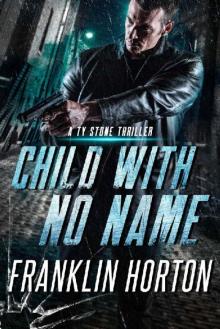 Child With No Name
Child With No Name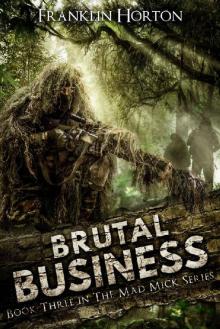 Brutal Business: Book Three in the Mad Mick Series
Brutal Business: Book Three in the Mad Mick Series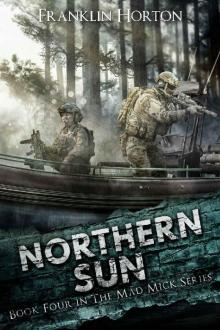 Northern Sun: Book Four in The Mad Mick Series
Northern Sun: Book Four in The Mad Mick Series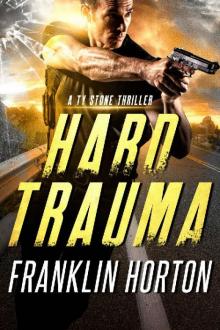 Hard Trauma
Hard Trauma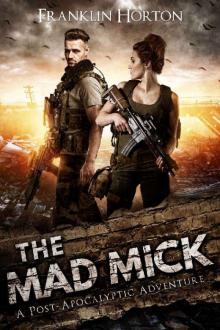 The Mad Mick: Book One of The Mad Mick Series
The Mad Mick: Book One of The Mad Mick Series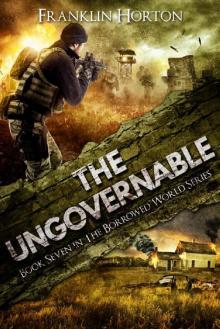 The Ungovernable
The Ungovernable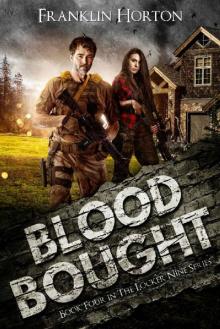 Blood Bought: Book Four in The Locker Nine Series
Blood Bought: Book Four in The Locker Nine Series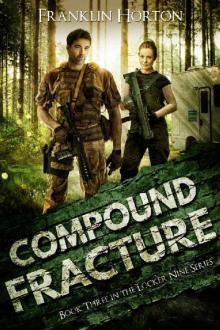 Compound Fracture
Compound Fracture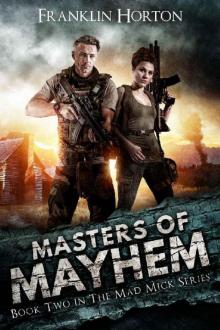 Masters of Mayhem
Masters of Mayhem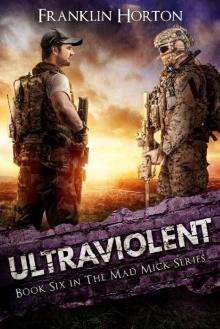 Ultraviolent: Book Six in The Mad Mick Series
Ultraviolent: Book Six in The Mad Mick Series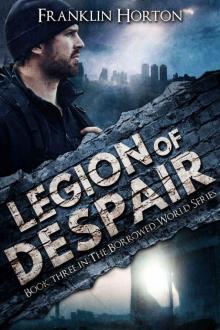 The Borrowed World (Book 3): Legion of Despair
The Borrowed World (Book 3): Legion of Despair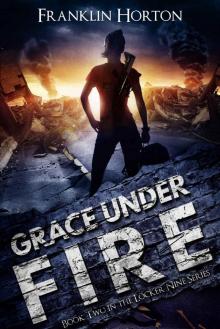 Grace Under Fire: Book Two In The Locker Nine Series
Grace Under Fire: Book Two In The Locker Nine Series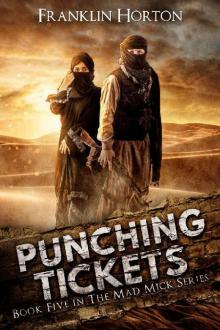 Punching Tickets: Book Five in The Mad Mick Series
Punching Tickets: Book Five in The Mad Mick Series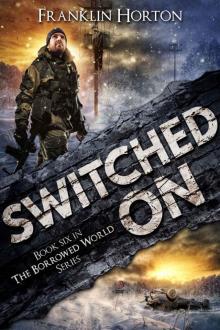 Switched On: Book Six in The Borrowed World Series
Switched On: Book Six in The Borrowed World Series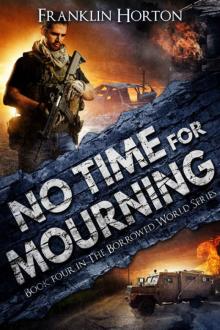 No Time For Mourning: Book Four in The Borrowed World Series
No Time For Mourning: Book Four in The Borrowed World Series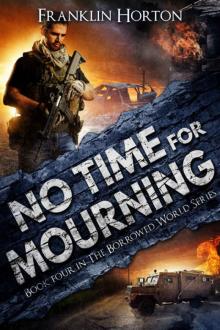 The Borrowed World (Book 4): No Time For Mourning
The Borrowed World (Book 4): No Time For Mourning Random Acts
Random Acts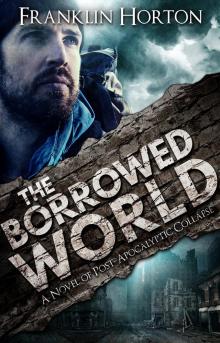 The Borrowed World: A Novel of Post-Apocalyptic Collapse
The Borrowed World: A Novel of Post-Apocalyptic Collapse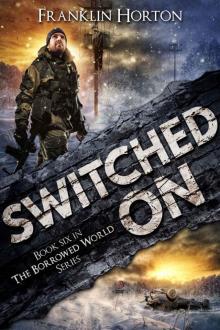 Switched On
Switched On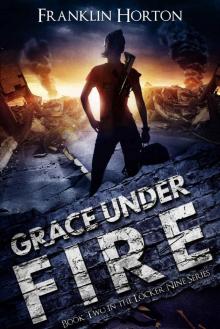 Grace Under Fire
Grace Under Fire Valley of Vengeance: Book Five in The Borrowed World Series
Valley of Vengeance: Book Five in The Borrowed World Series